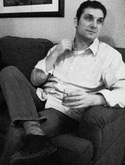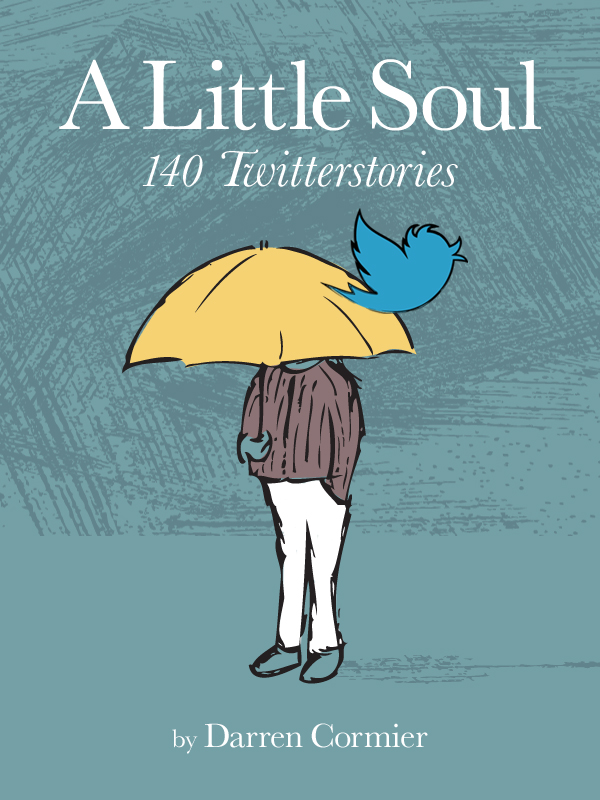Brian Lepire is a man of many hats: editor and contributing writer to the online pop culture zine Junkyard Arts; poet; lyricist and lead singer of a rockabilly band; playwright and actor; sous chef; student for a degree in publishing; and an aficionado of all cool storyteller music: think Nick Cave, Leonard Cohen, Jeff Buckley, Sex Pistols, etc. He also hates cats and tequila. Which is why his authoring of the third chapter of Tequila Kitty (found here) seemed so appropriate. And, lastly and definitely not least importantly, he's also a friend. I sat down with him recently over a glass of his hated tequila to discuss books, writing, and his own process.
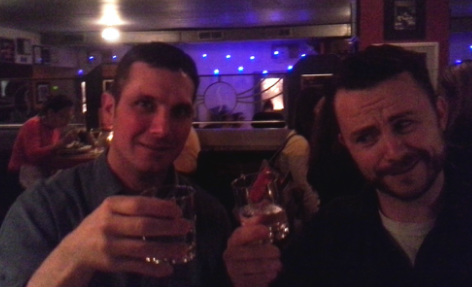
Brian Lepire, looking mighty skeptical about his tequila.
Q & A with Brian Lepire
Q: Tell me about what your writing. You write in a lot of different genres: poetry, prose, songs, drama, film criticism. Do you think they all feed each other, or do you have one particular genre that you consider your calling more than the others?
I view writing as a form of expression. It allows me to tap into my various thoughts, beliefs, and experiences. But there’s not just one genre that lets me expose all those elements. Some things I feel are better said through a poem than through a story, a three act play rather than a three verse song.
Then there are the articles and music reviews and film critiques. That’s my thirst for knowledge and new experiences coming out, as well as the desire to share that information with people. I would say my background is definitely in creative non-fiction and I derive a great amount of joy from writing a well-research, well-executed article.
Q: What would you say are your strengths as a writer?
I’d like to think I turn a good phrase here and there and pull together a coherent storyline with relatable characters. When I write, I spend a good amount of time making sure my characters are familiar enough so the reader doesn’t have to work excessively hard to see things from the character’s perspective. Another strength, and perhaps my greatest weakness, is I’m known for writing too tight sometimes – my sentences and paragraphs flow in such a way that editing can be a long and tumultuous project.
Q: What are you working on now?
I’m currently piecing together a collection of short stories, tentatively called THE PEOPLE WE MEET. I’ve spent a good portion of the past decade focused on my poetry and journalism, so writing short stories has been an exciting challenge. It’s forced me to dive deeper into the themes that surround my writing and my life.
Q: What publications has your work appeared in?
I’ve spent the past three years as a contributing writer and editor for Junkyard Arts, an online magazine aimed at exposing the masses to what’s happening in the art world and what’s worth paying attention to. You can also find my work at SalemFilmFest.com, where I am Online Media Editor.
My work has also been featured in Thirsty Magazine and several newspapers.
Q: Who are your primary influences, or inspirations, as a writer?
My influences are as varied as the genres I write in, but at the core they all seem to share a knack for packing great description and wit into crisp, memorable lines. Writers like Gay Talese, Leonard Cohen, F. Scott Fitzgerald, Neil Simon, and Hunter S. Thompson have masterful styles that I keep returning to for guidance.
Q: What inspires you the most (e.g. music, landscape/nature, written word, life, etc.)?
More often than not I pull inspiration from real life experiences, especially when writing poetry.
Q: Do you find there’s a difference in writing poetry or prose? Which comes easier to you? Which do you enjoy writing more?
There’s a definite difference for me between writing poetry and prose. Poetry has always been easier for me to write. My best poems usually come from brief moments of inspiration that turn into a feverish writing session that can last anywhere from 20 minutes to three hours. Prose takes more time and development, which is fun, but is more of a commitment for me than poetry.
Q: What are you reading right now?
Right now I’m catching up on Jack Kerouac’s THE DHARMA BUMS because I should have read it a while ago. I’m also reading BOOK BUSINESS: PAST, PRESENT, and FUTURE to prepare for my summer at the Denver Publishing Institute.
Q: What authors, when you read them, make you think, “I’m giving up writing because I will never be as good as them?”
Breece D’J Pancake. He was able to capture so much emotion without having to become overly verbose. His writing at times is very stark and completely captivating.
Q: I know this is the hated and borderline unanswerable question, but it has to be asked. Why do you write?
Because when I don’t write, food is tasteless and my blood is quick to boil. Writing gives me purpose, fuels my ambition, and allows me to express the world that I see. But most of all, writing is what I’m meant to do. I get very frustrated when I can’t write for long periods at a time.
Q: If you weren’t writing, what else would you be doing?
Publishing. Managing an independent press/independent bookstore. I want to provide an outlet to great writers who might be intimidated or feel burned by the big publishing houses. There are too many poems and stories and books that have never reached the public because the writers have been turned off by the whole process, and I think that’s a shame.
Q: Name your top five favorite books and/or top five favorite authors?
Oh man…why did you have to ask? My five favorite books, in no particular order: The Rum Diary (Hunter S. Thompson); On the Road (Jack Kerouac); Stranger Music (Leonard Cohen); The Prophet (Kahlil Gibran); and CASH: An Autobiography (Johnny Cash w/ Patrick Carr).
Q: What is your non-writing claim to fame?
Officiated the wedding of Sarah Murray and Liam Walker. A pretty big accomplishment in my book.
And now we get into the non-writerly, more silly-ish questions of the interview, as paraphrased from James Lipton of Inside the Actor’s Studio:
Q: What is your favorite drink?
Coffee
Q: What is your favorite curse word?
Fuck…it is such a versatile curse. Good for any fucking occasion.
Q: Favorite food?
Hot Dogs from Coney Island in Worcester, MA. And cheese. Man, I love cheese.
Q: What is your most vivid memory?
The night I met “The Man with the Bomb”. You’ll have to pick up the book when it comes out to find out more.
Q: What is your favorite sound?
The excited greetings of friends when I arrive to the party.
Q: What is your least favorite sound?
An unattended, screeching fire alarm.
Q: If heaven exists, what do you think god will say upon meeting you at the pearly gates? What would you want it to say?
I would want God to say “I hear you have some questions. Want to talk?” But It will probably say “How did you get in here?!”
Last week a new literary project (phenomenon?) was launched: The Adventures of Tequila Kitty. Thirteen writers were recruited to write one chapter each, only being allowed to see the chapter written before them. There were no limits on scope, style, or plot line. The only mandate was that one of the main characters of their chapter had to be a tequila swilling, alcoholic, sombrero wearing cat: Tequila Kitty, or Teqs. Chapter One: The Tequila-Mockingbird Incident can be found here
As part of this project, an interview will be posted within days of each author's chapter.
Chapter Two: Confessions of a Crazy Cat Lady was written by my good friend, the bartender poet, Aimee Hamel, who recently received her Bachelor's in Creative Writing-Poetry from Emerson College in Boston.
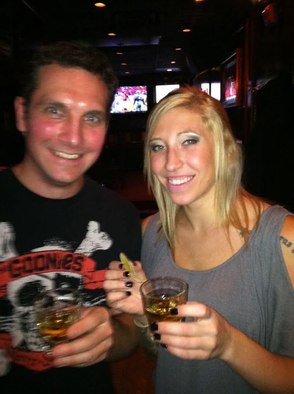
Aiimee and me moments before our mandatory Tequila shot.
Q & A with Aimee Hamel
Q: Tell me about what your poetry collection. When did you originally start it? How did it evolve? Was there a theme in your work you intended, or is it more just a collection of your works?
I actually started it a couple weeks before freshman year of college when I was talking to a future peer and he asked to see my work. I didn’t have anything to show so I wrote a poem in like 5 minutes to show him. An edited version of that poem did end up in my final poetry Thesis.
There was no intended theme, but as I went along it was pretty clear there was a theme forming. Each poem sort of had something to do with the trials and tribulations of being in love, and I ended up titling the collection after one of the poems: This Is Why I Choose to Be Alone.
Q: Give me a brief bio of your life:
I’ve been a New England girl all my life: grew up 40 minutes south of Boston, went to school at Emerson in Boston, and bartend in downtown Boston now. I’ve always been active in dance and sports, and in my older years am now heavily into fitness. I have always had a California state of mind and am currently saving up to move out there in a year or two.
Q: What would you say are your strengths as a writer?
I think my stuff is pretty easy to read, and I like that. I like that my poetry is complex but still understandable to most people, I think. I typically am drawn to write dramatic, depressing stuff, so once in a while when I attempt to write comedy (like this chapter in TK), and it’s actually funny to people, I definitely feel a sense of accomplishment.
Q: What are you working on now?
After taking almost a year off from writing after I was burnt out from writing my Thesis, Tequila Kitty got the ball rolling and I’m excited to start writing again. I’m going to try to publish some or all of my poetry collection, and I’m thinking about writing a short story.
Q: How has your upbringing influenced your work, if at all?
I don’t know if my upbringing really influenced it at all... I just remember as a 9 or 10 year old kid, always coming up with make-believe scenarios in the back yard with my neighbors. I also acted in middle school. I love a good story I guess.
Q: What inspires you the most (e.g. music, landscape/nature, written word, life, etc.)?
I’d say life. Weird stuff. Every time I see weird or creepy person, I want to write about him/her. A lot of times the weird stuff is the depressing stuff, so that’s why I think a lot of my writing is depressing, but I love it. This world is so strange and I just want to talk about it.
Q: Do you find there’s a difference in writing poetry or prose? Which comes easier to you? Which do you enjoy writing more?
I really do like them both. Lately i just love that you can tell a whole story in a couple of lines, with poetry.
Q: What are you reading right now?
As weird as it is, I managed to go all of high school and college not having read The Great Gatsby, so now that the movie is out I feel like I finally have to read the book. I literally don’t even know the story line, haha, so I’m interested to check it out.
Q: What authors, when you read them, make you think, “I’m giving up writing because I will never be as good as them?”
Q: I know this is the hated and borderline unanswerable question, but it has to be asked. Why do you write?
Unlike what I think a lot of people would say-- some nonsense along the lines of “I get the urge and I just HAVE to do it,”-- I don’t really feel any urge to do it. Half the time I convince myself I’m not that great of a writer. But then I eventually write something and at the end I find myself liking it and it’s always a pleasant surprise, like WAIT I actually am good at this, cool!
Q: If you weren’t writing, what else would you be doing?
Well over the past year that I wasn’t writing, I have been bartending and working out. Both of those things make me happy, and I’ll be continuing them even as I get back into writing.
Q: Name your top five favorite books and/or top five favorite authors?
Books: We Were the Mulvaneys, The Lovely Bones, Oryx and Crake, The Virgin Suicides........ Fifty Shades of Gray! I had to...
And now we get into the non-writerly, more silly-ish questions of the interview, as paraphrased from James Lipton of Inside the Actor’s Studio:
Q: What is your favorite drink?
Alcoholic: I don’t drink sugary drinks anymore since my diet, and I miss them!!! But technically my favorite would be Tequila Sunrise.
Non-Alcoholic: Anyone who knows me will tell you I’m obsessed with milk. Room temperature and drunk straight from the jug.
Q: What is your favorite curse word?
Cock sock
Q: Favorite food.
Clam chowder. I have to moderate my intake.
Q: What is your most vivid memory?
I’ve suppressed most memories before the age of like 14.
Q: What is your favorite sound?
Cat’s purring.
Q: What is your least favorite sound?
People chewing loud crunchy things. Like that one person in class who would bring carrots or a bag of Fritos during a lecture. Close your damn mouth or go away from me.
Q: If heaven exists, what do you think god will say upon meeting you at the pearly gates? What would you want it to say?
I hope that I will get enough done before this life is over so that he says “well done.” I hope he does not say, “#fail.”
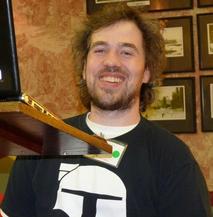 As part of The Adventures of Tequila Kitty, an interview with each writer will appear within a few days of their chapter being posted. Christopher Chik, an emerging and very talented author, is currently working on his Master in Fine Arts in Creative Writing from Southern New Hampshire University. His work has previously appeared in One Forty Fiction and also at his blogs Chasing Dimaggio and Occupy Mars. Q: Tell me about the novel you’re working on. When did you originally start the story? How did it evolve? What was the original kernel or acorn that became the story?
It’s the story of a baseball pitcher’s struggle with autism from childhood to the major leagues. I started the story around 2007 as a collection of my own autistic thoughts and tendencies fleshed out in awful scene snippets which would make even a bad experimental novel cry. The story was really born when I started the low-residency MFA at Southern New Hampshire University and my mentor, Wiley Cash, showed interest in the idea and pushed me to try other narrative approaches. I suppose the kernel was own experience growing up in an era when autism spectrum disorders were a relative unknown combined with my family’s history in baseball, particularly pitching.
Q: Give me a brief bio of your life:
I grew up and still live just south of Los Angeles and remember writing little stories of my daydreams since about second or third grade. As a child I loved sports, especially hockey and baseball and going to games with my Dad and Uncle David. I did a lot of camping and hiking with the Boy Scouts on my way to Eagle Scout. When I got older I took interest in philosophy which took my writing in a different direction for a while before I found my way back home to fiction again.
Q: What would you say are your strengths as a writer?
Most importantly, I take criticism well. I also read everything as a writer and editor, trying to dissect it and see what makes the heart beat and see how that applies to my own work, my own projects; to that end, I take a lot of notes while reading any book. I’m never satisfied and always try to learn and keep honing my craft.
Q: What are you working on now?
The novel for the most part, but I’m also working on some short stories, in particular a satire of the recent rash of American gun violence. My big project for the year, though it’s likely to take more than one, is a non-fiction effort about my favorite musician, Chuck Schuldiner, who was the front man for and creative force behind the band Death.
Q: What publications has your work appeared in?
OneFortyFiction
Q: Who are your primary influences, or inspirations, as a writer?
One of my best friends from high school has pushed me to write since I’ve known her, but I first got the idea of writing in my head at my local branch library. My parents left me there to read while they attended to something, and I found Bradbury’s Martian Chronicles and saw how a man put his daydreams, his fantasies, to paper. I was sold; I started dreaming of typewriters and, some years later, laptops. I’d have to sit around my parents’ offices a lot after school as well, so I’d find an unused typewriter and plot out my daydreams—at least, when I wasn’t making colossal paperclip chains. My mom has an English degree and got me to loving books real young. Seeing her write, even to little or no acclaim, gave me the affirmation I needed. Kids are so often short on confidence and long on doubts, it was nice having that as a beacon growing up.
Q: How has your upbringing influenced your work, if at all?
Being autistic obviously affects my WIP, the baseball novel, but having a physical disability probably had more influence. It hardened me, made me stronger, and gave me a more adult perspective to weigh my writing against. In elementary school, instead of stories about GI Joe and ninja fantasies, I’d write detective stories about serial killers and horror stories about things that go bump in the night.
Q: What inspires you the most (e.g. music, landscape/nature, written word, life, etc.)?
I’d have to say life, because I don’t really know otherwise. Sometimes you can’t sleep and are in bed watching Demolition Man for the five thousandth time, when epiphany strikes and the what-ifs start rolling around; sometimes a conversation sparks an idea for a story; sometimes the loathing of some existing aspect of human culture does it, especially when I get to writing satire.
Q: What are you reading right now?
Bang the Drum Slowly by Mark Harris and What We Saw at Night by my current and rocking mentor, Jackie Mitchard. The latter is really cool because the main characters have a genetic flaw that they don’t see as this big setback. I can really empathize with the way they think, that no holding back mentality. I’ve never had characters be so close to home for me.
Q: What authors, when you read them, make you think, “I’m giving up writing because I will never be as good as them?”
Raymond Carver comes pretty close. My writing mantra is “WWRCD?” Less is more, lean is mean, and all that jazz. Sometimes, though, a little poetry-spiced prose really lets that daydream form, and Toni Morrison weaves that into narrative with beauty and tension in the same breath. I try to strike a balance between the two.
Q: I know this is the hated and borderline unanswerable question, but it has to be asked. Why do you write?
I daydreamed a lot as a kid. Writing them down as stories was a way to share the process of make-believe outside of the playground. More than anything else, writing is a way to give the daydreams a reason to be, like an action figure is a reason to be talking to yourself, belly-down on the carpet.
Q: If you weren’t writing, what else would you be doing?
Playing and teaching guitar probably. I used to be on track for a career in law, but I wouldn’t trade writing for that ever.
Q: Name your top five favorite books and/or top five favorite authors?
In no particular order: Brave New World, Aldous Huxley; To Kill a Mockingbird, Harper Lee; What We Talk About when We Talk About Love, Raymond Carver; anything by Ray Bradbury; Zen and the Art of Motorcycle Maintenance, Robert M. Pirsig.
Q: What is your non-writing claim to fame?
I got my picture in the paper as a kid for being a wicked awesome Push-Cart Derby driver who could make the Kessel run on a wooden palette in under twelve Parsecs.
And now we get into the non-writerly, more silly-ish questions of the interview, as paraphrased from James Lipton of Inside the Actor’s Studio:
Q: What is your favorite drink?
Rum and Coke with a lime twist.
Q: What is your favorite curse word?
Asshat, though my favorite cursing of all-time is the chained diatribes of the dad in Christmas Story. That guy could out-swear two sailors and a pirate with mere gibberish.
Q: Favorite food.
Pepperoni, black olive, and roma tomato pizza with Newcastle or Longboard beer, and I’m a big fan of Señor Fish’s fish tacos.
Q: What is your most vivid memory?
I’m not sure I have a most vivid memory, but I can remember almost everything since age three. My second earliest memory is dancing around in my parents’ living room to Michael Jackson’s Bad playing on a little Fisher-Price tape recorder.
Q: What is your favorite sound?
Ocean waves lapping on the beach, that steady rhythm of the Earth’s pulse.
Q: What is your least favorite sound?
Dog alarms, like people mount on their fences. Any real high frequencies like most people don’t hear really. Forget ADT, I can be stopped dead in my tracks by a dog alarm.
Q: If heaven exists, what do you think god will say upon meeting you at the pearly gates? What would you want it to say?
Probably, “I told you so, jackass.”
I’d want a god to tell me the journey isn’t over yet, that I was interesting enough to merit a sequel. Truth be told, I’d like to make the Singularity and live forever. Wouldn’t it be cool to see the Sun eat the Earth from the safe distance of some colony on one of those Kepler planets? What happens when the universe ends or does it?
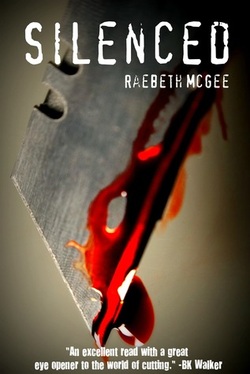 RaeBeth is the author of YA novel Silenced, the first in the Silenced series.
The book chronicles the teenage life of Amber Brown, outwardly a normal moody teenager struggling with acclimating to a new town in West Virginia, and trying to balance school, parental relationships, making new friends, and her new boyfriend Landon. To complicate matters, Amber discovers early in the book that the person she has known her whole life as her father, the very supportive Dave, is not her biological father, and that her mother and Dave have lied to her whole life. One of Amber's few solaces becomes the time she spends alone in her bathroom cutting, the releasing of blood and the self-inflicted wounds substituted for the lack of emotional connection she is able to make with others.
The excerpt below is from early in the novel, after Amber finds out that Dave is not her real father.
I stop talking and head out of her office. I trudge to my room crying. The pain's flowing generously right through my body. It's attacking my delicate heart trat tries so hard to be strong. That's where it fails. It hurts and once again the darkness is getting the best of me. I settle myself down, and notice I'm not in my room. I'm in the bathroom. It's hard to manage the pain. I swiftfly pull down my flannel, red checkered night pants and sit on the toilet. I turn to get the blade and see I already grabbed it from its cubby hole.
I drag the blade across my upper thigh. Blood rushes out and fills my hand. The warmth of it feels good, along with the sting, which is normal. All of a sudden everything goes blurry and I get lightheaded. I hurry up and recline myself on the toilet, the best that I can. This never happened to me before.
Sarah was a pro. She cut longer than I did. She taught me that the thigh has thicker skin, therefore you have to apply more pressure. I never tried, until now. Did I do it wrong? Did I hit a vein? I hope not. I bring myself back from nearly passing out by grabbing a cold washcloth . Three minutes pass before I check to see if I can stand up.
Q: Tell me about your novel “Silenced.” When did you originally start the story? How did it evolve? What was the original kernel or acorn that became the story?
I first started Silenced as a high school writing assignment and it was considered a short story. It evolved when my younger sister, Audra read it and suggested I added onto it. She’s not much of a reader, so when she told me this, I knew my story had to be special. The original idea came from my own experiences that I added on to as I did more research and interviewed more people for it. The main character is basically based off of several different people and her experiences within the book are actual events that has happened in real life to some of those people.
Q: Give me a brief bio of your life:
I started out writing poetry for myself as a way to express my feelings. Then I found the love of writing during my English class in high school. From there I put poetry to the side and began writing books. When I’m not focused on spending time with my family, I’m writing or blogging. I have a blog where I help promote other authors and their work. I’m a mother to one beautiful six year old little girl and I have another on the way. I’m married to the man of my dreams who supports every aspect of my writing.
Q: What would you say are your strengths as a writer?
I’m very organized. When I have something that needs done I get it done promptly. I don’t like to have it hanging around waiting to be completed. I’m the type of writer that will not hesitate to help another out. I think as a writer we (writers) should stick together. Especially self published.
Q: What are you working on now?
I’m in the process of finishing up the second part to Silenced which I’ve titled, “Silenced: The Overtaking.” I’m also working on a paranormal series which I am not going to talk much about seeing how it’s a long way from being published.
Q: What publications has your work appeared in?
At this time I have a poem I wrote that will be published into a book where several authors have come together to create it. I’ve had some of my poetry published on poetry.com.
Q: Who are your primary influences, or inspirations, as a writer?
My primary influence as a writer is life. There are so many things out there that can be wrote about and it’s hard to pick one to start with.
Q: How has your upbringing influenced your work, if at all?
As I was growing up, my mother pushed the books and reading more than television or games. We didn’t have cable, a computer, or gaming system. She felt (and still feels) that all of these, at times, tend to over take some people. There’s so much more to life then electronics. I believe if my mother didn’t do this, then I may not have found my love for books or writing. So a HUGE thanks goes out to her to helping me find one of my true loves within life.
Q: What inspires you the most (e.g. music, landscape/nature, written word, life, etc.)?
Inspiration comes from many things but as I said above... life is my primary influence. I do tend to get inspiration from other books or articles.
Q: What are you reading right now?
At this time I’m reading three different books when I have the time.
Bread of Fools , by Duncan McGonall
Burning Bridges , by Nadège Richards
The Hope Habit: How to confidently expect God's goodness in your life by Terry Law, Jim Gilbert
Q: What authors, when you read them, make you think, “I’m giving up writing because I will never be as good as them?”
I don’t believe there was an author to actually make me think this. There’s been a few to make me think that I want to be like them with my own writing. Thus giving me more drive to write better and get my work out there. I’d rather not name them because I don’t want anyone thinking I’m taking favoritism.
Q: Why do you write?
Here’s my own quote that I life by and that answers this question. “I don’t write to impress. I write to express!!”
Q: If you weren’t writing, what else would you be doing?
I’d be preparing blog posts for interviews, tours, or reviews for other authors on my blog. I’d be helping to share the work of other authors where I can. When I’m not doing that I’m cleaning my house or reading.
Q: Name your top five favorite books and/or top five favorite authors?
Oh this one is a hard one because there are so many great books/authors out there. Therefore, I can’t answer this one.
Q: What is your non-writing claim to fame?
This I am also unsure of because I’m not famous... therefore I don’t know.
And now we get into the non-writerly questions of the interview:
Q: What is your favorite beverage?
I love water but I also enjoy my coffee.
Q: What is your favorite curse word?
I don’t curse.
Q: Favorite food.
Cereal, Cocoa Wheat’s, and Pizza... I can’t choose just one here.
Q: What is your most vivid memory?
There’s so many. But the two that I won’t ever forget is the day I got married and the birth of my daughter.
Q: What is your favorite sound?
I love hearing rain and thunder.
Q: What is your least favorite sound?
Any high pitched noises. They agitate me.
Q: If heaven exists, what do you think God will say upon meeting you at the pearly gates? What would you want him to say?
For me... I believe heaven most certainly exists. I think God will be greeting me with open arms and say “Job well done.” I try to be the best Christian I can. As it’s known... there’s no perfect Christian but one can try to be. I would say, “Finally... I’ve been waiting my entire life for this.”
(character count: 173; without title: 140)
Q & A With an Exasperated Writer
Q: How did you come up with the idea for your new book?
A: Yes.
Q: Mmm...do you worry the angry tone will upset your old fans?
A: I like cheese.
Starting this Sunday, Scribblings and Bibblings will have a new feature: Twitterstories. Every Sunday, I will feature a new, original short story, each 140 characters or less. Sometimes the title will count against the 140 characters, sometimes it won't . When it doesn't I will preface the story by claiming it doesn't. These will be reposted on my Twitter page, my Facebook page, and, based on demand, via an email notification for those wishing to be part of the email list. Q: Will any of these stories have been previously published? A: Possibly. I have had a couple of short shorts published, one of which (subtracting the title) would qualify as a Twitterstory.Q: Do you have any Twitterstories that won't qualify for this project?A: Only those that are currently submitted to publications. Once I receive a rejection for those stories, they are eligible to be Twitterstoried. If they are accepted, once they are published, they will be Twitterstoried.Q: Will you be able to submit to any publications any Twitterstories that have appeared here? A: I don't know. I'll have to read the fine print of each journal to make sure (and to ensure that I didn't agree to a Garden Gnome of the Month Club subscription). Q: How did you come up with this idea? Do you think anyone will even care, or follow it?A: I am currently reading Lydia Davis (some friends would say that I really never stop reading her, and they would be right), and some of her stories could count as Twitterstories. Since I keep experimenting with the shorter and shorter form (there you go again, sounding all self-important and literary, and taking this fake interview format a little too seriously), I thought it would be fun. As for whether anyone will really care, or follow it? I hope so. They might be disappointed that some of the stories will be boring or make no sense, but I also hope that they'll stick around for the random times when it's good. Q: How long will this experiment last? A: Given my track record of follow through, probably one week. Q: Why not a Twitterstory of the Day?A: I'm not that prolific. Q: Will you eventually run out of material and have to use other writers' micro-stories as filler?A: No. Or, I should say, I hope not. Q: Is this blog post announcing the new project really just a filler post so you can claim you're updating this on a more regular basis?A: Shhhhhh.... you're given away all my secrets. Q: Are---A: You ask a lot of questions. Can I just finish this blog post?............Q: Are you going to eat that?
|




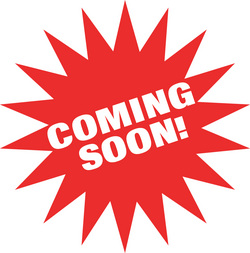
 RSS Feed
RSS Feed